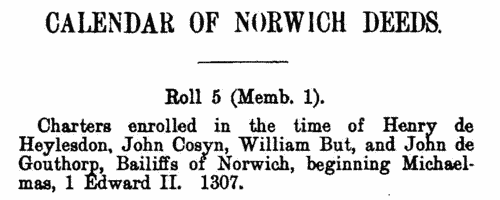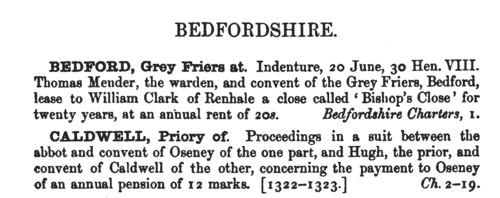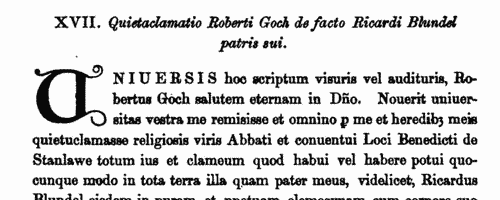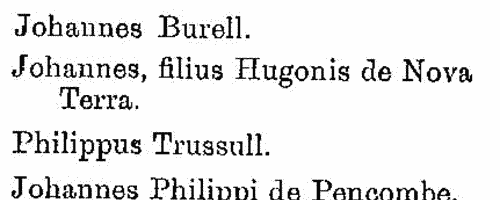Stanford Surname Ancestry ResultsOur indexes 1000-1999 include entries for the spelling 'stanford'. In the period you have requested, we have the following 583 records (displaying 41 to 50): Single Surname Subscription | | | Buying all 583 results of this search individually would cost £3,090.00. But you can have free access to all 583 records for a year, to view, to save and print, for £100. Save £2,990.00. More... |
These sample scans are from the original record. You will get scans of the full pages or articles where the surname you searched for has been found. Your web browser may prevent the sample windows from opening; in this case please change your browser settings to allow pop-up windows from this site. Inhabitants of Norwich
(1307-1341)
This calendar of the deeds enrolled from 1307 to 1341 was compiled for the corporation by Edith Crosse (MacKinnon), indexed by Walter Rye, and published by the Norfolk and Norwich Archaeological Society in 1915. They are set out chronologically, translated from the original Latin into English, giving the name and occupation of grantor and grantee, and naming the parish in which the property lay. Precise dates are not given, just the regnal year.STANFORD. Cost: £4.00.  | Sample scan, click to enlarge

| Clergy, the religious and the faithful in Britain and Ireland
(1305-1342)
These are abstracts of the entries relating to Great Britain and Ireland from the Regesta of popes Clement V, John XXII and Benedict XII. Many of these entries relate to clerical appointments and disputes, but there are also indults to devout laymen and women for portable altars, remission of sins, &c. This source is particularly valuable for Ireland, for which many of the key government records of this period are lost. Clement V was consecrated and crowned 14 November 1305 (the day from which his pontificate is dated); John XXII was crowned 5 September 1316; Benedict XII 8 January 1335 and died 25 April 1342. From 1309 onwards the papacy was in exile at Avignon. The extracts were made by W. H. Bliss from Regesta lii to cxxxvi, and published in 1895. Bliss remarked that 'although the writing of the Papal Registers of the 14th century is clearer than that of many contemporary English MSS., the entries in them were for the most part founded upon petitions or letters from different countries, and the scribes in the Papal Chancery must have experienced even greater difficulty in copying English proper names than English students experience nowadays in reading the early Chancery Rolls preserved in the Public Record Office. Not having local or personal knowledge, they constantly misread doubtful letters.'STANFORD. Cost: £4.00.  | Sample scan, click to enlarge

| Clerks and Clergy in Herefordshire, Shropshire and Gloucestershire
(1327-1344)
The register of bishop Thomas de Charleton of Hereford, containing general diocesan business, but also including ordination lists for monks and clergy. Only a small proportion of the clerks went on to acquire benefices and remained celibate. Hereford diocese covered almost all Herefordshire, southern rural Shropshire, a westward arm of Worcestershire, and a northwestern slice of Gloucestershire.STANFORD. Cost: £6.00.  | Sample scan, click to enlarge

| Oxfordshire Charters
(1340-1349)
A large accumulation of documents preserved in the Bodleian Library, Oxford, formerly constituted the antiquarian collections of Anthony a Wood, Roger Dodsworth, Ralph Thoresby, Thomas Martin of Palgrave, Thomas Tanner bishop of St Asaph, Dr Richard Rawlinson, Richard Furney archdeacon of Surrey, and Richard Gough. A calendar of these was prepared by William H. Turner and published in 1878 under the title 'Calendar of Charters and Rolls preserved in the Bodleian Library'. The word 'charters' is here used in a rather loose sense, including virtually any manuscript or copy of a manuscript, but the bulk of the contents consists of mediaeval deeds of conveyance. Turner's calendar deals with each briefly, naming the principal parties and the nature of the deed, but hardly ever lists the witnesses. Many of these charters were undated (dating of deeds did not become general until around 1350) or so damaged or defective ('mutilated' is Turner's usual description) as no longer to display a legible date. However, he contrived, from the style of the script and/or the nature of the contents, to estimate dates in such cases. The sample scan is from the start of the Bedfordshire list. STANFORD. Cost: £4.00.  | Sample scan, click to enlarge

| Lancashire and Cheshire tenants, patrons and friends of Whalley abbey
(1178-1350)
About to leave for the Holy Land in 1178, John, constable of Chester, founded an abbey at Stanlawe (Stanlow) in Cheshire, endowing it with the townships of Staneye (Stanney) and Aston. Inundated by the sea at Stanlow, the monastery was removed to Whalley in Lancashire in 1294, and this foundation of Cistercians (grey monks) became one of the wealthiest in northern England. It received grants of lands in Ince, Garston, Childewall, Aykebergh, Little Woolton and Warrington in southwest Lancashire; Eccles, Barton, Maunton, Swynton, Pendleton, Worsley, Hulton, Westhalghton, Rumworth, Pendlebury, Cadishead and Denton in the south; Spotland, Chadwick, Castleton, Marland, Todmorden, Rochdale, Whitworth, Heley, Falenge, Chaderton, Wardle, Howarth and Saddleworth in the east; Wytton, Derwent, Plesyngton, Balderston, Salebury, Read, Downham, Clithero, Ribchester, Withnall, Wheelton and Stanworth in Blackburn hundred; and Warton, Carleton, Steyninges, Elswick and Preston in Amounderness hundred; as well as further property in Cheshire, in Chester, Nantwich, Northwich, Aston, Backford, Walton and Wynlaton. A careful copy of all these grants was compiled in the 14th century in what is called the Coucher Book or C(h)artulary of Whalley Abbey. The evidence had been carefully sorted and collated in twenty chapters or titles, each containing a transcript of the grants and evidences relating to a separate parish or township. The people that appear in these deeds are the donors, the witnesses, and occasionally tenants or occupiers of adjoining plots of land. The Coucher Book was edited for the Chetham Society by W. A. Hulton, and published in four volumes, starting in 1847. STANFORD. Cost: £4.00.  | Sample scan, click to enlarge

| Inhabitants of London
(1337-1352)
Letter Book F of the City of London contains enrolments of recognizances between inhabitants, particularly citizens, for sums of money lent or due; grants of pieces of land or property; and various records relating to the city administration, minor infractions, &c. The book includes an assessment of the inhabitants in 1346 (pages 143 to 149) listing many householders; a list of mayors and sheriffs from 1189 to 1548 (276-303), and records of the city's use of infangthef (summary execution of certain criminals) down to 1409. The text was edited by Reginald R. Sharpe and printed by order of the Corporation of the City of London in 1904.
STANFORD. Cost: £4.00.  | Sample scan, click to enlarge

| Grantees of offices, commissions and pardons
(1350-1354)
The Patent Rolls are the Chancery enrolments of royal letters patent. Those for the 24th to the 27th years of the reign of king Edward III (25 January 1350 to 24 January 1354) were edited for the Public Record Office by R. F. Isaacson, and published in 1907. The main contents are royal commissions and grants; ratifications of ecclesiastical estates; writs of aid to royal servants and purveyors; and pardons. STANFORD. Cost: £2.00.  | Sample scan, click to enlarge

| Testators and legatees in London
(1258-1358)
The mediaeval Court of Husting of the city of London sat (usually on a Monday) each week: among its functions was the enrolment of deeds and wills relating to citizens of London. In their strictest technical sense the terms 'will' and 'devise' are appropriate to real estate, and the terms 'testament', 'bequest' and 'legacy' to personal estate, but this distinction is lost sight of in ordinary usage. This calendar of wills proved and enrolled in the Court of Husting was edited by Reginald R. Sharpe, records clerk in the office of the Town Clerk of the City of London, and printed by order of the corporation in 1889. The date of the court is given in italics, with the year in bold in the margin. The testator's name is given in capitals (surname first, in bold), and then a brief listing of substantial bequests, with the names of legatees, and then the date of making of the will, and reference. Sometimes there were further proceedings in the court relating to the will, such as 'It was found by a jury that the testator was of full age when he made the above testament', a statement as to where the testament had been proved, or proceedings on a challenge to the testament &c. - such additional material is added in a smaller typeface in this edition.STANFORD. Cost: £4.00.  | Sample scan, click to enlarge

| Clerks and Clergy in Herefordshire, Shropshire and Gloucestershire
(1344-1360)
The register of bishop John de Trillek of Hereford, containing general diocesan business, but also including ordination lists for monks and clergy. Only a small proportion of the clerks went on to acquire benefices and remained celibate. Hereford diocese covered almost all Herefordshire, southern rural Shropshire, a westward arm of Worcestershire, and a northwestern slice of Gloucestershire.STANFORD. Cost: £6.00.  | Sample scan, click to enlarge

| Clergy, the religious and the faithful in Britain and Ireland
(1342-1362)
These are abstracts of the entries relating to Great Britain and Ireland from the Regesta of popes Clement VI and Innocent VI, from the period when the papal court was resident at Avignon. Many of these entries relate to clerical appointments and disputes, but there are also indults to devout laymen and women for portable altars, remission of sins, &c. This source is particularly valuable for Ireland, for which many of the key government records of this period are lost. Clement VI was consecrated and crowned 19 May 1342 (the day from which his pontificate is dated); Innocent VI was crowned 18 December 1352 and died 12 September 1362. The extracts were made by W. H. Bliss and C. Johnson from Regesta cxxxvii to ccxliv, and published in 1897. The registers are almost complete for these two pontificates. At his accession, Clement VI promised to grant benefices to all poor clerks who should come to Avignon and claim them within two months of his coronation. As many as 100,000 are said to have come, and the register for the first year of his pontificate runs to twelve volumes.STANFORD. Cost: £4.00.  | Sample scan, click to enlarge

|
Research your ancestry, family history, genealogy and one-name study by direct access to original records and archives indexed by surname.
|












